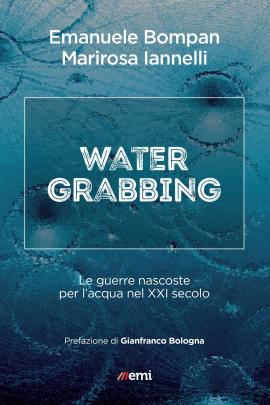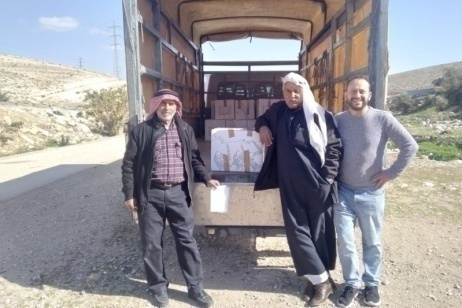
Book cover of “Water Grabbing. Le guerre nascoste per l'acqua nel XXI secolo” (emi, 2018), written by Emanuele Bompan and Marirosa Iannelli.
Emanuele Bompan is an environmental journalist and a geographer. He has reported from 70 different countries and with Water Grabbing Observatory team he is in charge of detecting, analysing and communicating social environmental and economic issues related to water and climate, contributing to raise awareness on such subject in Italy and globally. “Water Grabbing. Le guerre nascoste per l'acqua nel XXI secolo” (emi, 2018), which he wrote with Marirosa Iannelli, is his latest book reporting on how water grabbing has increasingly become the core of conflicts, social instability and migration.
“Hidden water wars”: why have you chosen this definition? What are these wars and why are they hidden?
A title must always attract attention, this is why we used a strong word, that is war. In fact, the book deals with conflicts: political tensions that may involve communities and people oppressed by state, regional or private economic forces aiming at controlling water resources. We wanted to focus on the concept of conflict because we believe that environmental instability can lead to strong political and security instability. We are increasingly moving towards a world that will be environmentally and climatically different from the one human beings have had over the last 11,000 years, and the way in which climate change is mainly visible is through water. On the one hand, increasing population wants to consume more and more, on the other, water availability is decreasing due to climate change and pollution. The poorest areas of the planet are also the most exposed to change; this means that water is decreasing even more in areas where it is already scarce, which opens up scenarios of potential conflicts to control it, many of which already exist.
Could we really experience the “century of water wars”?
Water will be an end, that is, people will fight to control it, or a means, that is, the vehicle of a power strategy. The latter was dealt with, for example, in a reportage on Israel and Palestine, where water management is a political advantage or disadvantage for two peoples. Furthermore, the issue of water may be a coincidence in 21st century wars: deterioration of water resources and worsening of water management due to prolonged conflicts will further undermine food security and sanitation for people living in areas that are already directly affected by conflicts of various kinds – as we see in Yemen or Syria, where the lack of water has had a devastating impact on the victims of the conflict. So I would say that the answer is “we are entering the century of water wars”.
Also in the book “Water Grabbing”, you deal with the need to apply circular economy around the world to cope with global change. How can one overcome the limit posed by players of global economy and politics who have no intention to move in this direction? How can one persuade companies to be truly circular? Are there any positive examples in this framework that you would like to mention?
Undoubtedly, solutions for integrated and circular water management already exist. By this I mean: avoid wasting water and limit its dispersion, adopt technologies maximising water efficiency and, most importantly, draw benefit from waste stemming from water management. Today, only part of global water is treated/purified, whereas it would also be possible to draw energy and materials to be reused from water processing plants, including through collection of urban waste that is then transformed into compost. Smart water management is the secret to system efficiency, which ensures resilience to environmental shocks and much more. All water companies, or those for which water is the core of the supply chain and business, should be interested in developing resilient strategies. Unfortunately, in many cases, they have not yet understood that water can be a weakness in their business. Especially in the farming sector, poor management of water can hinder survival of business in the medium and long term, which may lead to bankruptcy.
To face these problems, it is therefore necessary to invest in water-resistant crops that are suitable for the area in which they are grown. It is essential to support indirect policies, namely related to consumption. It is crucial to choose products having low water footprint and not to waste food. I always remember this fact: we throw away 30% of our food production, which means allocating a significant part of global water to waste that we do not know how to exploit.
These are basic elements for efficient water management. There are many positive examples in this sense. Technologically speaking, Israel is certainly at the forefront, but also Italy and the Netherlands have always adopted smart methods to use their water wealth. In several countries of the world people struggle to protect biodiversity and experiment sustainable crops. How can one achieve an integrated global water plan? Diplomacy and the UN must bring to negotiating tables all those States that have never signed any international water management treaty, or for which water and the environment are not founding elements in the national legislation. There are many steps to be taken, the challenge is obviously huge and time is short. Fortunately, technologies and policies to win it already exist, but what is lacking today is simply the will to apply them.
In the next five to ten years more and more companies will understand that circular economy is a long-term strategic advantage: not an additional cost but rather an additional profit. Implementing an increasingly integrated and symbiotic system of the industry at the transnational level is the cornerstone of our future and of the future of next generations, as well as of the economic future of companies. Let us always remember the mantra “No water is more expensive than water that is not there”.
Some days ago the European Academies’ Science Advisory Council released a piece of news highlighting the numerous health risks posed by climate change. Also in this case, one of solutions suggested by scientists is linked to reorganization of our food system. What do you think about it? Can we consider it as one of the main solutions to deal with these emergencies?
Two actions can be done today to ensure a resilient future: mitigate emission of greenhouse gases, which are mainly linked to consumption of fossil fuels and land use, therefore to deforestation and intensive farming, and rethink the way we consume and produce food.
Production must adapt to new environmental scenarios and mitigate the impact on land: farming must be integrated with forests, which reduces land consumption while maintaining high yield. Waste must then be reused in a smart way, ensuring a circular process.
Consumption-wise, it is undoubtedly necessary to decrease animal proteins, as a matter of fact even a small reduction would be sufficient for a sustainable impact. We should also avoid not only waste but also purchasing imported food, especially from areas exposed to climate change or water scarcity, because if we continue to consume, we take water from countries that are already poor of it: we use global trade to grab the right to water of populations.
It is basically crucial to have a thorough view of the water system. What blocks us today in acting decisively against climate change - and which explains why so many people are struggling to do it and to understand what is happening - is precisely the fact that environmental issues are extremely multifaceted, which applies to many areas related to each other at different degrees and in ways that have never been experienced. All journalists, experts, scientists who have the privilege to know this issue and the way it is emerging in the world, can explain how action is not possible when not observing the issue as a whole and not understanding it fully.
In your reportages on water grabbing around the world, you have come across several scenarios of tensions underway. Is there a specific one that struck you also for the potential conflict it may trigger?
Certainly, among the many conflicts, the one on the Mekong River really struck me. It is very interesting, because it shows how, in a water basin extending in six different nations (China, Burma, Thailand, Laos, Vietnam and Cambodia) that are particularly interested in the great resource it represents – to produce energy but also to have water for farming and fishing - nobody knows the medium-long term impact of the construction of an impressive number of water infrastructures, including no less than 39 megadams. 2019 recent drought and the relevant reduction in rainfalls have already shown the risk potential: water available is decreasing and those who own dams tend to fill their own basins, giving less to neighbouring states. In such a context, a war can potentially be seen: a clash of states where water is a control tool or a “weapon” exploited in the event of political tension, especially when it comes to authoritarian states.
There are many similar cases. In Ethiopia, for example, there are conflicts due to water scarcity between tribes, which we told about in our reportage; they are not significant clashes but equally dangerous tensions. Tribes that no longer have water due to the construction of a number of dams in the Omo valley were forced to move and started fighting with other tribes, as they compete for land and limited resources.
Do you think new genocides may occur?
Genocides may occur in some densely populated areas, including African great lakes, in case space and water were increasingly limited. In the civil war in Syria it was clear that the lack of water can widely exacerbate pre-existing tensions between different political groups. In this regard, I would mention Lake Chad, which is one of the large global water basins decreasing at an impressive rate: between 1962 and 2014 it lost over 90% of its surface. This is an actual environmental crisis in a region having 40 million inhabitants where water scarcity and progressing desert allowed Boko Haram to gather followers. When there are few resources, it is easy to drag hopeless young people towards such ideological madness. With Water Grabbing team we have drafted a chilling map showing all Boko Haram attacks in the area around Lake Chad: tens of thousands of massacres, some involving over 500 people. It is a nefarious religious genocide enhanced by an environmental issue linked to water.
Any upcoming projects?
Undoubtedly, Atlante geopolitico dell’acqua (Hoepli) that will be released in September 2019. We will work on new reportages with Water Grabbing: our mission is to continue documenting and talking about complex issues of water and climate change around the world.





